Once a year, we do this thing that you all seem to love so much. We produce a list of 20 people at Trinity College Dublin who you should probably know, simply because we think they’re pretty great.
We never purport to produce a list that compiles the only great people in Trinity, nor suggest that we’ve created a list with the 20 greatest people, simply because our editorial infallibility does tend to fail us now and then.
That being said, we have had six iterations of the Trinity Twenty, so apparently it means something to someone. In the same spirit, and for the first time, we’ve done our best to compile a list of 20 Trinity students and graduates who are running in today’s general election. They are not necessarily the best Trinity graduates running for election, or the most influential Trinity graduates running for election, but 20 people who are already making waves, or have potential to. And, we tried to speak to as many of them as we could to get a feel for how big these waves might become.
1 Josepha Madigan
Fine Gael, Dublin–Rathdown constituency

The Fine Gael councillor and French and German graduate has a whole host of talents. From running her own law firm, to penning a racy legal thriller Negligent Behaviour, Madigan believes that she has the potential to make a unique contribution to the Dail: “I just decided then that I couldn’t sit on the couch anymore, and give out about the government.”
Reminiscing fondly on her time in Trinity, Madigan says: “Your whole social life, your whole world, existed within the four walls and you didn’t have to go anywhere else.”
Despite claiming that she’s not “getting ahead of [herself] or anything”, Madigan is due to move her law firm’s office to Molesworth Street, just a few steps from Leinster House.
The daughter of a Fianna Fáil councillor, Madigan describes her father as a “great mentor”, who died in 2014 less than a month before she was elected to Rathdown council.
Madigan is facing up to the big challenge of getting voters to recognise her name in the upcoming election, especially since her running mate is former Minister for Justice, Alan Shatter: “I have a harder job to do to get people to know who I am because I’ve only been a councillor for the Dublin Ward, and not for the whole Dublin Rathdown.”
Madigan is confident her legal background can help her in the Dáil, and can perhaps help give her the edge over some of her fellow TDs. Yet she believes political life was never mapped out for her: “These are the things that happen in life, sometimes you don’t plan things, but the opportunities arise and you just have to grab them.”
Gender quotas, for Madigan, are an unfortunate consequence of a political world still unfriendly to women. But gender quotas will provide part of the solution: “It’s not family friendly, the political world, but if we don’t have someone on the inside changing that, it’ll never change.”
2 Niall Ó Tuathail
Social Democrats, Galway West Constituency

Ó Tuathail left the glamorous world of McKinsey behind to return to Ireland to run for the Social Democrats in Galway. Reminiscing on his early days with the company, Ó Tuathail said: “My first very conference call at McKinsey was between Kofi Annan, Mary Robinson and Desmond Tutu.”
Yet it was the state of the country in 2011 that really made him wake up and want to get involved: “I care passionately about the country, and what direction it’s going in, and even though I was never party political, I was always political.”
The scholar and Trinity Gold Medal winner, awarded to the top undergraduates, certainly has an impressive CV. However, “societies and clubs were just as important to me and my development during college as the academics were”, he says.
Treasurer of DU Dance, member of the Central Societies Committee, and a senior tutor in the Voluntary Tuition Programme, Ó Tuathail must have possessed that rare ability to maintain that precarious balance between academic work and society commitments.
Ó Tuathail was confident that the Social Democrats party machine in Galway can help deliver him a seat in the Dail: “We have about a hundred volunteers working with us out here, and really there is no substitute for building a big people-powered campaign if you want to win first time round.”
Arguing that he has as much real-world experience as any TD currently in the Dáil, Ó Tuathail says: “We do need to bring new blood into politics, and I think that if any organisation isn’t bringing in new people, it will start to perform less well and will die away.”
For him, it’s about ending the dominance of the “stale cartel” of Fine Gael and Fianna Fáil, and giving a new party a chance to dictate the direction of the country.
3 Gary Gannon
Social Democrats, Dublin Central Constituency

For Gannon, Trinity was all about the “conversation” with fellow students: “Every day was a discussion, every day was a debate.”
A former apprentice plumber, Gannon came to Trinity through the Trinity Access Programme (TAP), studying History and Political Science, and now works as an ambassador for it: He describes how he “made some incredible friends, learnt to think critically, and to understand the world around me a little bit better”.
It was growing up and witnessing the “injustice” in north Dublin first made Gannon politically aware. His parents were involved in the anti-drugs movement and “those sorts of things formulate you without you ever really knowing”.
A councillor in Dublin north, Gannon realised he could do more if elected to the Dail: “If I ever wanted to make the kinds of changes that will improve people’s lives for the better, that’s going to require legislation.”
Unsurprisingly, it’s education that’s a priority for him. Criticising the potential introduction of a student loan scheme for higher education (it “won’t widen demographic, or improve standards”) Gannon describes how his party is “working towards a totally publicly funded education system”, even if this is very much a long-term goal.
Gannon is optimistic that such changes can be achieved. Referencing Trinity College Dublin Students’ Union (TCDSU) President, Lynn Ruane, Gannon emphasises his pride at “some of the student leaders that have emerged over the last five years”.
He is not complacent however, and realises that the Social Democrats cannot assume they will gain the student vote: “We have a wealth of support among students, but so do other parties.”
4 Catherine Ardagh
Fianna Fáil, Dublin South Central Constituency

The Fianna Fáil candidate did her LLM in Trinity, after doing her undergraduate degree in the London School of Oriental and African Studies.
Describing herself as a “centre-right” student at a “very left-wing, liberal college”, joining the Liberal Democrats was about as a radical as Ardagh got, missing much of the hype surrounding the student protests against the Iraq War.
Having studied economics and law in London, Ardagh brought her less than orthodox knowledge of law to bear on her Trinity postgraduate degree: “I did my thesis on a comparative analysis of Islamic Law and ancient Irish law.”
Her father is a former Fianna Fáil TD, and it’s likely that this is where the interest in politics began. Despite his advice to, “stay well clear” of politics, Ardagh found herself running in the 2009 local elections.
Unsurprisingly perhaps, she was unsuccessful, but she didn’t let this deter her: “If you actually think you have a contribution to make, you stick with it.”
Ardagh describes herself as always being an “advocate” for gender quotas, but expresses concern that the quota system used may not even fully achieve a more dramatic increase in female faces in the Dail. However, quotas can’t solve everything, and Ardagh believes that there is a “lot more we can do on the inside before we go down the route of drastic changes”, such as introducing mentoring systems.
On February 11th, Fianna Fáil promised that the student contribution fee would not rise for five years if they were elected to government. Ardagh took this position when speaking to The University Times prior to the announcement, who expressed concern about rises in the student contribution. “€3000 is still quite a lot of money”, she said. “Students should have loans available to them in college” to support the cost of their education.
5 Cathleen Carney-Boud
Sinn Féin, Dublin North West constituency

One of only two candidates in our list currently studying in Trinity, Cathleen Carney-Boud is running in Dublin-North West, and is currently a first-year law and political science student. The Trinity Access Programme student has had a busy few years, being elected to Dublin City Council the same year she started in TAP.
With her “keen interest in things like law and politics anyway”, the course was perfect for her. As a mature student with three children, Carney-Boud has found it important to have Lynn Ruane as president: “It’s great having someone mature students can really relate to.”
It was in 2006 that she became a card-carrying member of Sinn Féin, and found the party a natural home: “I would have always known some people involved in Sinn Fein”
Indeed, she was always political, and from a young age was “always very involved in community groups”. Being a student herself, Carney-Boud is in a unique position among most politicians, in that the challenges facing higher education will affect her too.
Like many students, she is worried about the potential introduction of student loans, both for herself and for her children. Echoing the Sinn Féin party line, Carney-Boud would welcome a reduction in the student contribution fee by €500, and incrementally move towards free education for all.
6 John Lyons
Labour, Dublin North–West constituency

Coming from NUI Maynooth, where he did his undergraduate degree, the Labour TD found himself sitting in an interview in Trinity for his postgraduate degree in teaching, telling the panel of interviewers that his first preference was for a course in Maynooth. Despite remembering thinking, “Oh God, you’ve ruined that, you’re not going to get it”, he did get offered a place in the college. Yet he turned it down.
He soon found himself in Trinity however, studying for his postgraduate degree in special education in the Church of Ireland College of Education in Rathmines. At the time he was teaching, “there was a big absence of trained professionals in special ed in Ireland”.
Finding he was “all right” at dealing with children with special needs, he applied to the Department of Education funded course for special education at Trinity. Yet it wasn’t at all a typical student experience, Lyons emphasises: “We were all adults of all different experiences.” He describes it as: “Like training as a teacher again in a much, much better way.”
The first of his family to do the Leaving Cert and go to college, Lyons sees politics not as a jump from his old career, but as something he was always involved in. For him, anyone who gets involved in politics believes in something “bigger and better”, and he was no different: “I was just a community person, took pride in my community, and was one of those people who took stood up for their community.”
Despite the difficult five years for Labour in government, Lyons is still positive about the experience: “I have lost count of the amount of times whereby I could totally endorse and standover the absolute commitment of my colleagues in their trying to work out what’s best for the country.”
Speaking to The University Times prior to the publication of the Labour Party manifesto, Lyons is adamant that Labour is the best party to protect and support higher education. He emphasised his concern that “if we didn’t have a Labour minister [after the next election] you would be most certainly guaranteed that you would be paying student loans to go to college”.
7 Averil Power
Independent, Dublin Bay North constituency
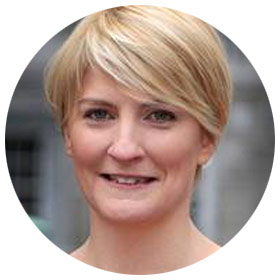
Averil Power is well known among those involved in TCDSU, having served as both Education Officer and President between 2000 and 2002. In an interview with The University Times, Power recounted her time in Trinity, having studied BESS and specialising in business and politics. Power’s first three years in College were spent outside of the union, only having gotten involved in her final year, when she ran for Education Officer. One of the main issues at the time were the library opening hours, something which she attributed to her difficulty in studying for her exams. Power also attributed her ‘outsider’s perspective’ to winning the Student Union election, “I had never gone to council, I had no idea what the officers did, I just saw a load of problems in college that hadn’t been fixed”.
Power, a current Senator contesting election in the Dublin Bay North constituency, is running this year on a strong platform for mental health, third level education, equal opportunities, and repealing the eighth, stating that what frustrates her the most about the current political debate is that “Fine Gael have made it all about taxes”. Her involvement in the recent marriage referendum has also gained her a considerable profile over the last few years, along with a growing youth support.
8 Lucinda Creighton
Renua, Dublin Bay South constituency

The leader of Renua has been a TD since 2007, and is running for re-election in Dublin Bay-South. Having studied law at Trinity, she was also a member of Young Fine Gael, the party she was eventually expelled from in 2013 after voting against the party whip against the Protection of Life During Pregnancy bill.
Since its conception last year however, Renua has struggled to gain much of a national platform, and has failed to even gain society status in Trinity.
Speaking at the TCDSU party leaders debate in November, Lucinda Creighton, the leader of Renua, also expressed her support for a new lending agency for the offering of low-interest loans.
9 Jan O’Sullivan
Labour, Limerick City constituency

The current Minister for Education, Jan O’Sullivan, is a Trinity graduate, who hit the headlines in January by announcing that Labour would reduce the student contribution by €500 if elected, as well as plans for €100 million in additional funding to higher education and supports to postgraduate students.
A TD for the Limerick constituency, O’Sullivan has been Minister for Education since July 2014, and has overseen the creation of the government higher education funding working group, chaired by Peter Cassells.
If re-elected, O’Sullivan will have to oversee the publication of the report, which as The University Times reported in December, will probably recommend an income-contingent loan scheme, something that has faced fierce opposition from the Union of Students in Ireland (USI) and students’ unions across the country.
In an interview with The University Times last year, O’Sullivan said that she did not “want to go down the road of students finish and end up with a very large bill – with people owing €50,000”. However, she subsequently refused to rule out the introduction of a student loan scheme, or an increase in the student contribution charge.
10 Mary Lou McDonald
Sinn Féin, Dublin Central constituency

An English literature graduate and deputy leader of Sinn Féin, McDonald has quickly become one of the most recognisable TDs in the country.
She hasn’t always, however, been welcomed back to her alma mater with open arms. In November 2014, McDonald was forced to cancel a visit to Trinity after a group, in support of abuse victim Mairia Cahill, had gathered outside the Hamilton Building to protest her visit.
Speaking to The University Times in February, McDonald reflected happily on her time in Trinity: “I loved the subject, the course, the people.”
With Sinn Féin looking set to do well in the next election, it’s very easy to see what attracts people to the party many see as the strongest left-wing voice in the country. Describing the values of Sinn Féin to The University Times, McDonald emphasised that: “We believe in democracy, Irish unity and social justice.”
11 Ciarán Cannon
Fine Gael, Galway East constituency
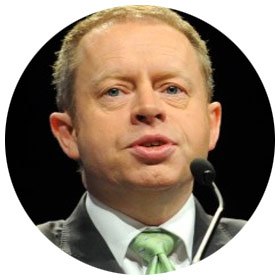
The Trinity graduate was elected to the Dáil in 2011, and will be fighting to keep his seat in Galway East. The former leader of the Progressive Democrats, he joined Fine Gael in 2009.
A former Minister for Training and Skills, Gannon represented Fine Gael at the TCDSU Party debate, emphasising the party’s commitment to the results of the government’s upcoming report on higher education funding, adding that he was hoping for “some realistic, tangible options that are based on a forensic examination of the sector”.
However, he did not commit to any particular funding model, something his party has still failed to do, stating: “We need to be creative”.
In 2014, before he was shuffled to position of Minister of State, Cannon called for the development of a digital learning strategy, and argued that all students doing the Leaving Cert should have the option of doing it on computers and tablets, rather than by hand.
12 Alex White
Labour, Dublin–Rathdown constituency

Alex White, the current Minister for Communications, Energy, and Natural Resources, attended Trinity College, studying economics and social studies – graduating in 1981. He was a student activist whilst in college and was elected President of TCDSU. He was later elected to the officer board of the Union of Students in Ireland (USI). White’s experience in communications has been longstanding. He has previously been a current affairs producer with RTÉ, working on major events such as general elections, and served as editor of the Gay Byrne show for four years before leaving to take up practice as a barrister.
White is currently seeking re-election in his Dublin South constituency, advocating to repeal the eighth, and promising to take action against climate change. When asked what led him into politics, White answered that “we all want change – on the environment, education, health, equality. I came to the view that the best way for me to achieve change was to get into politics and have an influence”.
13 Shane Ross
Independent, Dublin South
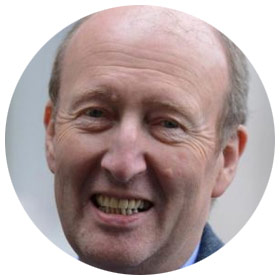
Before he was elected as an independent to the Dáil in 2011, Shane Ross was the former business editor of the Sunday Independent, and the longest-serving member of the Seanad.
Ross studied history and political science in Trinity College Dublin, graduating in 1971 and was soon elected to the Seanad as an independent candidate for the University of Dublin. He has been re-elected nine times, becoming the longest-serving member of the upper house. Ross recently took part in the forming of the Independent Alliance, a grouping of independent election candidates, that is not a registered political party, but promise “radical but responsible” political change.
14 Leo Varadkar
Fine Gael, Dublin West constituency
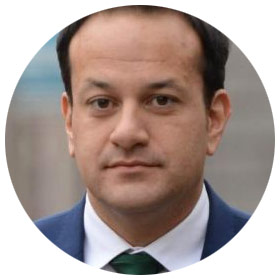
Probably the most well-known TD on this list, Minister Leo Varadkar is the current minister for health, elected to the Dáil in the last general election. He is a qualified medical doctor and is the first openly gay Irish government minister. Varadkar studied medicine in Trinity where he was a member of Young Fine Gael, eventually becoming chair of the society. After graduating from Trinity Varadkar was appointed to the Fine Gael frontbench as the spokesperson for Enterprise and Innovation. He is often invited back to his alma mater to launch different initiatives such as Med Day and the recent Ice Bucket challenge for MND in September 2014.
For this current election, Varadkar promises, if elected, to campaign to repeal the eighth, stating at a recent talk to Trinity’s Politics society that he found it worrying that the current abortion legislation does not take into account the “long term health of the mother” adding that “for all its flaws, we have the eighth amendment. I do think there should be a right to life of some sort in the constitution but not as it is now”.
15 Diana O’Dwyer
Anti-Austerity Alliance, Dublin Central constituency
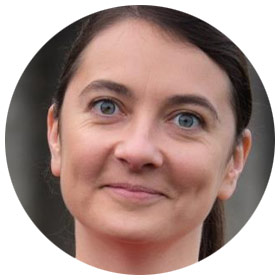
Diana O’Dwyer is running for the Anti-Austerity Alliance for Dublin Central. O’Dwyer studied English in Trinity College however, despite her political involvement now, she stated that she wasn’t into societies and was quite “cynical” towards both Fianna Fáil and Fine Gael, “I was more into left wing politics”.
In an interview with The University Times, O’Dwyer stated that the current shift towards left-wing politics was proving “how Irish society is changing. There is no hold from the catholic church anymore and the law is trailing behind”. O’Dwyer also added that she was against third level fees, and would campaign for the abolition of JobBridge, calling it a “disgrace” and a “failure of the political establishment”.
16 James Lawless
Fianna Fáil, Kildare North constituency

James Lawless is contesting this year’s General Election as a Fianna Fáil candidate for Kildare North. He studied Maths in Trinity College from 1995-2001, followed by a masters in High Performance Computing. In an interview with The University Times, Lawless spoke of living in Front Square and spending a lot of time “in the arts end” despite being a science student. His experience in societies was quite broad, being an active member of the Literary society, the publications committee for TCDSU, as well as the Politics Society and the Wolfe Tone Cumann, a branch of Ógra Fianna Fáil. Lawless stated the found the left wing parties in Trinity “very ideological at the expense of actually achieving progress”. Fianna Fáil, he found, were “doing things that mattered to the people that they represented”.
Lawless’s main focus is transport, and he recounted that his first political experience outside of TCDSU was with the train service, where he set up a lobby group to discuss with Irish Rail any improvements that could be made to the service, “I’m not really a protester, I don’t really go up and down the streets with placards … but I would be someone that sits across the table and say ‘what are we trying to achieve here?’” When asked how he felt about contesting this year’s general election, Lawless stated that he was both “nervous and excited”, adding that he thinks he has “a lot to offer” and that current politics needs to “adapt to the current change in demographics”.
17 Paschal Donohoe
Fine Gael, Dublin Central constituency
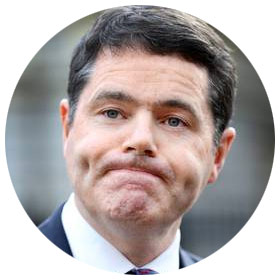
Donohoe is the current Minister for Transport, Tourism, and Sport. He attended Trinity from 1992 to 1996, studying Economics and Politics. He served as secretary of the University Philosophical Society, and was chairperson of Trinity’s branch of Young Fine Gael. In an interview with The University Times, Minister Donohoe stated that being involved in college life had a “huge influence” in getting him interested in politics.
The happiest summer he ever spent was in 1993 in the Graduates Memorial Building, organising the year ahead of the Phil: “The Phil was going through cycles, it was tough at the time. We put loads of work into speakers and it paid off”. Yet like so many students, this society involvement was detrimental to his studies: “I spent more time enjoying other things.”
Despite his involvement in Young Fine Gael, stating that whilst the society was something he enjoyed, “it wasn’t at the forefront of [his] mind” and doesn’t credit it having a large influence in his path to politics.
For Donohoe, while social media is important in getting students involved in politics, “nothing can take the place of talking to people on their doorsteps”, with the old-fashioned methods of canvassing and knocking on doors still vital in winning votes.
18 Jimmy Dignam
Workers’ Party, Dublin North West constituency

This is Jimmy Dignam’s first general election, contesting the race in Dublin North-West. He studied business in Trinity College and is a former member of the socialist party, he has taken part in campaigns such as “Right2Water”, “Community Solidarity” and “Defend Blanchardstown Hospital”. Dignam’s main concern, if elected, is to scrap the water charges and “hold a referendum to put public ownership of natural resources” in the constitution. His other priorities lie in fighting for working class communities in terms of jobs, housing, health and childcare.
19 Thomas Byrne
Fianna Fáil, Meath East constituency
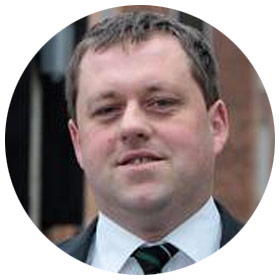
Senator Thomas Byrne is contesting the next General Election as a candidate for Fianna Fáil in Meath East. Byrne studied in Law in Trinity College from 1994-1998 where he was an active member of the Law Society. He went on to become a qualified solicitor and Attorney at Law in New York. After losing his seat in the 2011 general election, Byrne was elected to the Seanad in that April, speaking on the Cultural and Education panel. Byrne is the current Fianna Fáil spokesperson on health.
20 Maura Hopkins
Fine Gael, Roscommon–Galway constituency

Fine Gael Councillor Maura Hopkins is a member of Roscommon County Council, having been elected in May 2014, and is currently contesting the Roscommon–Galway constituency. Hopkins studied Occupational Therapy at Trinity College, before being elected to her county council. She has a strong affinity for local issues, something that has gained her a lot of support. When asked about issues that concern the youth of today, such as repeal the eighth, Hopkins admitted that it is “a very sensitive and complex issue” and remained non-committal, adding that she believed that “public discussion and careful consideration must take place to examine any changes required”.
Correction: 18:25, February 26th, 2016
An earlier version of a subheading in this piece incorrectly said that Cathleen Carney-Boud was a Fianna Fáil candidate. She is a Sinn Féin candidate.






